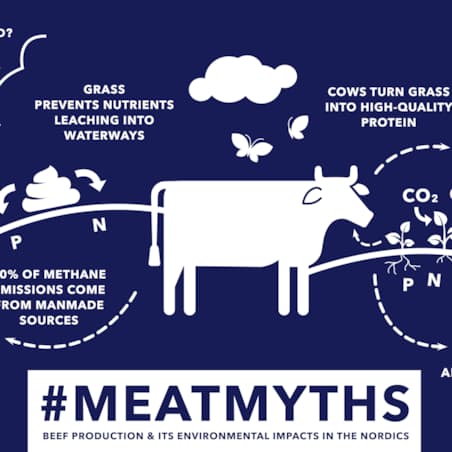As consumers we are becoming more conscious. We want to know in detail what our food contains, how it nourishes and what are the health aspects as well.
In this Meat Myths article series, we break myths related to meat. This article focuses on common myths around meat-eating. When eating according to nutrition recommendations, you can enjoy your meat with a good conscience, especially when you choose domestic meat.
Myth 1: Meat is unhealthy
It is not sensible to categorize food as healthy or unhealthy, diet should always be considered as a whole.
Meat is rich with nutrients and moderate meat-eating has benefits for your health. Meat is high in good quality protein, i.e. it contains all the essential amino acids that your body needs. In addition, meat, especially red meat, is a good source on easily absorbed heme iron. Meat is also a source for various essential minerals, like zinc, selenium and magnesium. You can get a bunch of your daily vitamin B requirement from meat. A big part of meat’s fat is unsaturated, even though meat is one of the main sources for saturated fat. According to nutrition recommendations you should replace foods high in saturated fats with foods high in unsaturated fats. Good thing is, that the fat in meat is often visible, so you can cut it off if needed.
Plate model is a practical guideline for healthy eating. Half of the portion you eat should be vegetables, one fourth different protein sources and last fourth fiber rich carbohydrate sources. Rationing according to plate model in every meal helps you to eat versatile and in moderation.
Thanks to beef’s versatile and nutrient dense composition, it is shown to be quite a sustainable choice also when environment is taken into consideration.
White meat, like chicken and turkey, is suggested by the nutrition recommendations, because it contains less fat and the quality of fat is better than in red meat.
Myth 2: Red meat causes cancer
Single foods, like beef steak or bacon, haven’t been proven to cause cancer. International Agency for Research on Cancer review of red* and processed** meat classifies red meat as probably carcinogenic and processed meat as carcinogenic. Even though people who eat excessively red and processed meat have higher risk for certain cancers, this doesn’t mean that these meat types automatically cause cancer. There are a lot of confounding factors in nutrition research. For example, people who eat a lot of meat, tend to have other unhealthy life styles, like eating less vegetables and exercising less, which may add or confound harmful effects connected red meat.
Cancer is a very complex disease and may be dependent on a combination of many factors including age, genes, diet, environment and lifestyle. It is difficult to separate a single food from this big picture. To prove causal relation, there should be a mechanism that causes cancer identified in meat. Such a mechanism has not been found.
The industry has put in place a set of preventive actions to decrease potentially harmful factors in meat and processed meat. Measures include for example the optimization of heating and smoking to decrease harmful ingredients, as well as reduction of the use of nitrite. Furthermore, salt and fat levels have been decreased in different meat products. In HKScan we have developed Omega 3 pork, where the fat quality alters due feed: saturated fat decreases and unsaturated fat increases.
Just like you can protect yourself from too much sun light with sunscreen, you can take health-actions when eating red meat: eat your greens, control cooking methods, remember moderation when eating red meat (max. 500g cooked red meat per week), exercise, keep normal weight and avoid smoking and excess alcohol consumption.
Myth 3: Meat is not easily digested
Nutrients like protein and iron are more easily absorbed in the body from meat compared to vegetable sources.
Feeling full after eating meat? Thanks to meat’s high protein content it keeps you satiated for longer. Satiety is good thing in weight maintenance, because it may help you to avoid food cravings and control your portion sizes.
Myth 4: Meat is not necessary
You don’t need meat as you don’t need milk, eggs or fish or even apples for make your diet versatile and healthy.
There are many ways to compose a healthy diet. However, when meat is a part of the diet, you get most of the nutrients easily and absorbable, no vitamin or mineral supplements needed. Balanced nutrition is not about good foods or bad foods, it is about moderation. When following nutrition recommendation and eating meat accordingly, meat is not a health threat, but a valuable part of a healthy diet.
Text: Soile Käkönen, Health & Nutrition Manager
*) red meat = beef, pork and lamb
**) processed meat = meat that has been transformed to enhance flavour or improve preservation, e.g. hot dogs (frankfurters), ham, sausages, bacon










